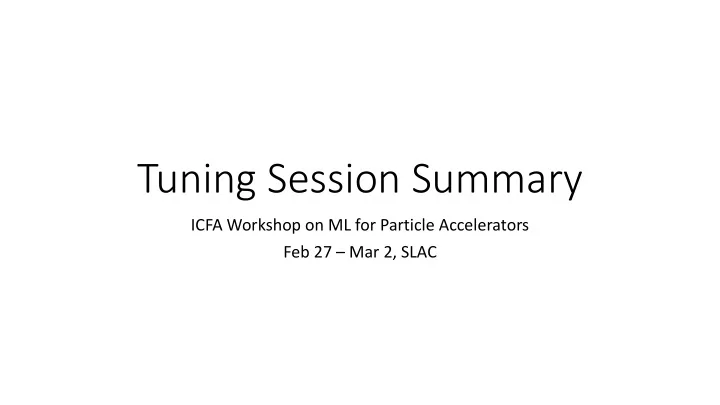

Tuning Session Summary ICFA Workshop on ML for Particle Accelerators Feb 27 – Mar 2, SLAC
Overview of Talks • FEL taper tuning – Juhao Wu • Introduction to Bayesian Optimization – Johannes Kirschner • Gaussian Process Optimization at SLAC – Joe Duris • Tuning at XFEL + Online Modeling with Ocelot – Sergey Tomin • Tuning at FERMI@Elettra + Stochastic Optimization – Giulio Gaio • General Experience with Online Optimization (ES / RCDS) – Alexander Scheinker / Xiaobiao Huang • Sloppy / Genetic Algorithms for Low-Emittance Tuning at CESR – Ivan Bazarov
Summary of Discussion • ML-based tuning methods • RL for taper tuning: 2x increase in pulse energy; new zig-zag taper (new physics?) • Bayesian optimization / GPs à sample efficient way to trade off exploration/exploitation • How effective for different amounts of drift (varies from machine to machine) • Already have very effective local optimizers that don’t rely on any ML or knowledge of specific machine behavior RCDS and ES – many examples in simulation + experimental results for wide range of applications (in-hardware • beam loading compensation, tuning at LANSCE, various optimizations at SPEAR3 and other rings, taper optimization for LCLS) Easily transferrable to different problems • Perhaps not yet as widely used in the accelerator community as they should be? • • Finding the most impactful knobs for tuning prior to optimization looks promising (esp. for then sending to methods that don’t scale as well?) • Important to develop good metrics for optimization (e.g. FEL quality factor at FERMI)
Summary of Discussion • Do fall into local minima in machine tuning (manually + with automated tuning) – example from LCLS needing to re-tune from scratch à How to ensure you’re in a suitable part of the parameter space at the start of local optimization? à How to realize when you’re in a local minimum? • Interplay between a priori system models, ML system models, non-ML local optimization algorithms, and ML-based optimization algorithms • When is it worth it to invest the development effort use ML for tuning? • How often switching between different configurations, how much drift in machine, how complex is the specific machine physics
Recommend
More recommend